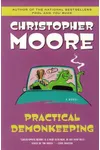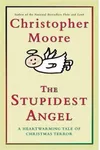Welcome to Pine Cove, a quirky Californian coastal town where the supernatural crashes into everyday life with hilarious results! Christopher Moore’s Pine Cove series, a trilogy of comic fantasy novels, invites readers into a world of eccentric locals, mischievous demons, and lustful sea monsters, all wrapped in Moore’s signature irreverent wit. This cult-favorite series blends heart, humor, and the fantastical, making it a must-read for fans of offbeat adventures.
From the moment you step into Pine Cove, you’re hooked by its oddball charm—think small-town vibes with a side of chaos. Whether it’s a demon on the loose or a Christmas miracle gone awry, Moore’s storytelling keeps you laughing and guessing. Let’s dive into the origins, tales, and lasting allure of this delightful series.
How Pine Cove Began
Christopher Moore kicked off the Pine Cove series in 1992 with his debut novel, Practical Demonkeeping, inspired by his time living in Cambria, California—a real-life coastal town that shaped Pine Cove’s fictional setting. Drawing from influences like Kurt Vonnegut and Douglas Adams, Moore wanted to craft humorous stories about flawed, relatable characters facing extraordinary circumstances. His love for comic timing, honed by watching comedians like Robin Williams, shines through in Pine Cove’s zany plots and sharp dialogue.
Moore’s goal was to blend the absurd with the heartfelt, creating a universe where supernatural chaos meets human warmth. The series grew from this vision, with each book introducing new oddities while staying rooted in Pine Cove’s quirky community. Fans quickly embraced Moore’s unique voice, turning the trilogy into a beloved staple of comic fantasy.
The Heart of Pine Cove
The Pine Cove series comprises three novels, each a standalone adventure packed with supernatural hijinks. Practical Demonkeeping (1992) introduces Travis O’Hearn, a 100-year-old ex-seminarian stuck with Catch, a green demon who loves snacking on humans. Travis’s quest to banish Catch in Pine Cove spirals into chaos, involving winos, neo-pagans, and a djinn. The Lust Lizard of Melancholy Cove (1999) brings a prehistoric sea beast, nicknamed Steve, whose lust-inducing pheromones wreak havoc when the town’s psychiatrist swaps antidepressants for placebos. Finally, The Stupidest Angel (2004) delivers a chaotic Christmas tale where a bumbling angel’s miracle attempt unleashes zombies and kung-fu chaos.
Moore’s Pine Cove thrives on themes of human connection, resilience, and the absurdity of life. The series’ small-town setting, with its colorful cast of misfits—like constable Theophilus Crowe and ex-B-movie star Molly Michon—grounds the fantastical in relatable struggles. His irreverent humor, often dark and zany, pokes fun at human flaws while celebrating their quirks. The blend of supernatural thrills and heartfelt moments creates a unique tone that’s both wild and comforting.
The series’ style leans heavily on Moore’s comedic roots, with fast-paced plots, witty banter, and unexpected twists. Pine Cove itself feels alive, its coastal charm and quirky history (like the Head of the Slug saloon) adding depth to the chaos. Whether it’s a demon’s buffet or a sea monster’s romantic rampage, each story balances laughs with surprising emotional weight.
Why Pine Cove Resonates
The Pine Cove series has carved out a niche in comic fantasy, earning a devoted cult following for its fearless irreverence and lovable characters. Fans adore Moore’s ability to make the absurd feel human, with stories that resonate through their mix of humor and heart. The series’ influence lies in its unapologetic weirdness, inspiring readers to embrace life’s oddities and find joy in the unexpected.
Moore’s work, including Pine Cove, has been praised by authors like Nicholas Sparks for its craftsmanship and humor. While the series hasn’t spawned films (despite early interest from Disney), its legacy endures through its passionate fanbase and Moore’s continued success. Pine Cove remains a testament to the power of storytelling that doesn’t take itself too seriously yet leaves a lasting impact.
- Publication Years: 1992, 1999, 2004
- Number of Books: 3
- Notable Award: The Stupidest Angel won the Quill Award for Science Fiction/Fantasy/Horror (2005)
Ready to laugh your way through a demon-filled, sea-monster-charged adventure? Grab Practical Demonkeeping and plunge into the wonderfully weird world of Pine Cove’s comic fantasy!


